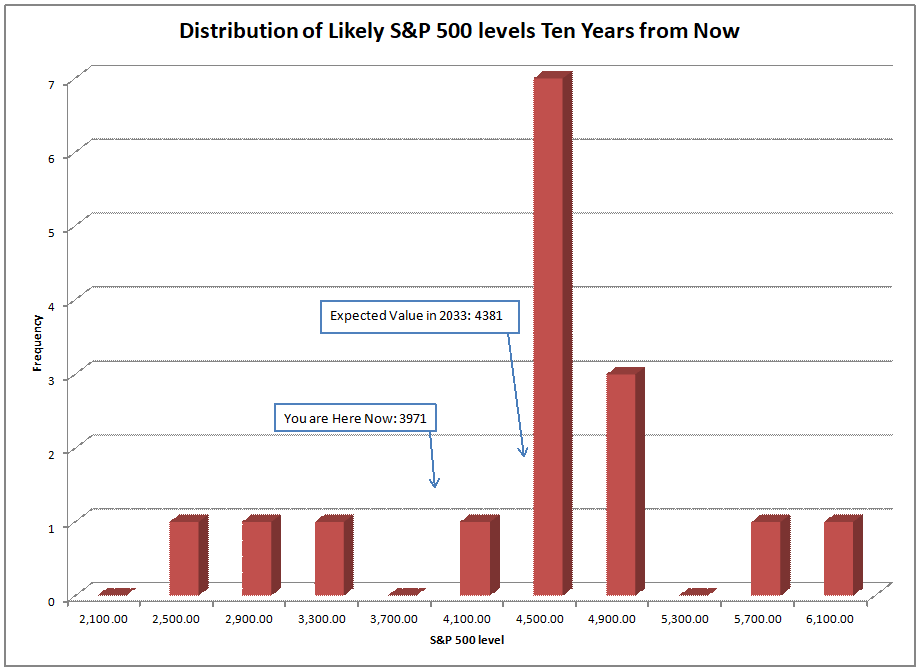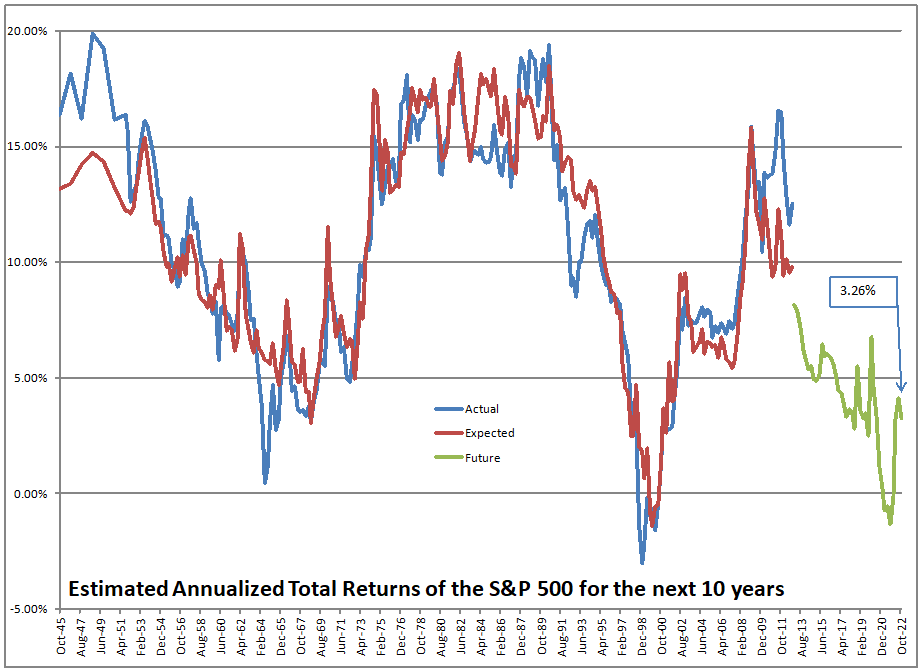Picture Credit: Aleph Blog || I know this is late, but still, here it is…
At December 31st, 2022, the S&P 500 was priced to return 3.26%/year over the next ten years. Given the rally since then, that return has shrunk to 3.12%/year. Currently the 10-year Treasury yields 3.38%. In investment grade corporates, you could earn more, but… really, who knows?
They say the stock market climbs a wall of worry. We’ve got enough worries to go around.
- Wars. With the superpowers posturing and fighting proxy wars, trade wars, and real wars, it doesn’t take that much for a bigger conflict to emerge. Oh, and are we replacing the stocks of weapons that we have been giving away?
- Plagues. Okay, we’ve been through that recently. Maybe we don’t get that again for a while.
- Famine: Partially due to the Ukraine war, partially due to weather, there are many places in the world facing food scarcity.
- Social Insurance plans facing a crackup. Notice the protests in France from moving the retirement age from 62 to 64? Things like this will happen in many developed countries. And for those of you who don’t remember an old piece of mine on Social Security, there will be a payment event around 2032.
- Around that same time, maybe 20% of US states will have severe events regarding the defined benefit plans for public sector employees.
- With the yield curve inverted, money is getting sucked out of bank deposits and into T-bills, or something like them.
- The Fed does too much. After years of being a “superhero,” trying to create permanent prosperity, they have created an economy that has too much debt. Congress and the President regularly run huge deficits with the tacit support of the Fed. After creating the problem where many bank assets are below par, they offer a one-year program allowing the banks to value the assets at par. Will it only be one year, or will the accounting chicanery become permanent?
I may be a little cranky at this point, but I remain fascinated at politicians and policymakers in DC who engage in magical thinking. There is a great advantage to have the world’s reserve currency, but it is not unlimited. At some point, the notional credit line will be exceeded. If/when there is a tipping point, it will be ugly.
Let me show you one more graph regarding possible future outcomes for the S&P 500 in early 2023:

The above graph assumes a 2% dividend on the S&P 500, and uses prior market periods +/- 1% in terms of expected returns. There is a long left tail, but not as long as the Great Depression, which of course can never happen again, right?
Valuations are still extended. We are still in the 95th percentile as far as this model is concerned. You might do better with value stocks, foreign, emerging market, and small stocks, but this is still an awkward time to be long the winners of the last bull phase of the market.
One final note: 80% of my total net worth, and 95% of my liquid net worth are invested in the strategies in which my clients are invested. I still maintain a posture of 70% invested in risk assets and 30% in safe assets. To me, it is a happy medium balancing risk and return.
Also, I know I haven’t been writing much, but I plan on writing more. That said, time is short for me.


Your comment: ”time is short for me”. I hope this means you are very busy and that otherwise you are well. You are one of the very few honest, sane voices out there.
In your old piece: “People overestimate the inflation threat. But if it is going to happen, you can rely on the government to end indexation of benefits and tax brackets before inflation gets strong.”
Prescient! In the UK the tax brackets have been fixed with the result that inflation creates more income for the Treasury through “fiscal drag”.
There has been shouting in the media about stopping the indexation of benefits – especially for the “old age pension” – but the government has resisted so far. That shouting has been accompanied by vituperation against the baby boomers that would be called “hate speech” if the like were directed according to race rather than age.